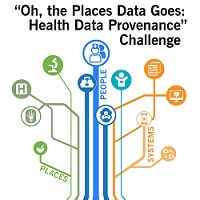 The Department of Health and Humans Services (@HHSGov) Office of the National Coordinator for Health Information Technology (ONC) (@ONC_HealthIT) announced the Phase 2 winners of the “Oh the Places Data Goes: Health Data Provenance” Challenge.
The Department of Health and Humans Services (@HHSGov) Office of the National Coordinator for Health Information Technology (ONC) (@ONC_HealthIT) announced the Phase 2 winners of the “Oh the Places Data Goes: Health Data Provenance” Challenge.
The winning solutions were submitted by 1upHealth (@1up_health) and RAIN Live Oak Technology. 1upHealth piloted the use of its partner’s provider application to surface provenance information and help providers find aggregated data from various sources using Health Level Seven’s (HL7®) Fast Healthcare Interoperability Resources (FHIR®) standard along with improvements afforded by smart contracts on the blockchain’s public ledger.
RAIN Live Oak created a software toolkit enabling health information systems of any size to integrate provenance into their data-flow without disrupting existing practices or data repository requirements.
“Ensuring provenance of data is an important step in achieving interoperability of health information,” said Don Rucker, MD, national coordinator for health information technology. “We look forward to seeing these winning submissions being implemented in electronic products that will allow for the secure, trustworthy, and reliable exchange of health information.”
Provenance is important in healthcare because it helps a person or entity receiving data be confident in its authenticity, trustworthiness, and reliability. The winners of Phase 2 of the challenge submitted a recorded demonstration, solution guide, and lessons learned focused on prototyping and testing the effectiveness of their solution.
The need for health data provenance and standard approaches to capture it is an important priority across the health information technology system. It is complex and plays a role in almost everything related to the use and exchange of electronic data. The winning submissions demonstrated innovative and standardized solutions that could lead to improvements in the provenance of health data, and will help the healthcare industry better maximize health data that is already digitized and ready to share.
Congrats to the “Oh the Places Data Goes: Health Data Provenance” Challenge Phase 2 Winners!
1st Place – @1up_health
2nd Place – RAIN Live Oak Technology
Learn more: https://t.co/fIpAygBBeF #Data #HealthIT #HealthData @HealthIT_Policy @ChallengeGov pic.twitter.com/4xe9p16jbA— ONC (@ONC_HealthIT) March 13, 2018
